Jake Eagle's Blog, page 16
September 20, 2013
Dating Relating Mating
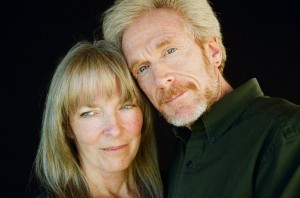 A Map For Romantic Relationships
A Map For Romantic RelationshipsWalk, run, rest. Hop, skip, jump. Birth, life, death. Everything has a rhythm—an order. This is true for romantic relationships, but most people don’t know or pay attention to the order. It goes like this: Dating, Relating, Mating. And when I use the term “mating,” what I mean is entering into a long-term commitment with your partner.
If you get this order right, and you do what’s appropriate and necessary in each stage, you will dramatically increase your likelihood for having a healthy romantic partnership. So here’s the short story:
The first stage is Dating
It lasts maybe 2-3 months and might be considered a test-drive. This stage should be easy, fun, uncomplicated, and light. If it’s not easy and fun, we suggest that you stop and look for another partner. But, instead, what a lot of people do is they start out working too hard, even in the dating stage. They find a parter who “pushes their buttons” and they think this represents a chance for them to grow and so they dig in and work hard. Big mistake—in my opinion.
If you work hard in the Dating stage all you’re doing is building a relationship that will require hard work.
We don’t believe in that. We believe that life is challenging enough and we want our romantic partnership to be easy, and fun, and enlivening.
The second stage is Relating
This is the time—usually a couple of years—in which you do need to work out your differences, reach clear agreements, and learn to be a healthy “we.” But, this too doesn’t have to be hard. The secret to this stage is placing more emphasis on how you relate to one another (kindly), how you reach agreements (flexibly), how you deal with your differences (respectfully)—regardless of what you’re talking about.
This stage is all about personal conduct. It’s about how you behave. If you learn to treat each other like friends, ask for what you want instead of complaining about what you don’t get, maturely express your feelings, and create agreements and boundaries that make you feel safe and respected—you’ll lay a foundation for continued growth, happiness, and contentment.
Stop thinking about winning, debating, proving your point, keeping score, tit-for-tat, or using the childlike logic that results in questions and statements such as, “Well, how would you feel if I did that?” or, “I only did what I did because you did X.”
We all learned to have those rather immature conversations when we were children—but very few of us ever learned to have a completely different kind of conversation. Yet, we can. And this is what Reology teaches us—how to have a different kind of conversation. A conversation that makes partnering easy and elegant.
The third stage is Mating
This is what happens after you decide to be a couple with a long-term commitment to one-another. Now that you’ve made your commitment, the focus becomes one of honoring your commitment, captivating your partner, and celebrating your love.
This stage can be incredibly exciting as you learn to go deeper and deeper, discovering more about each other, and about yourselves. No longer hesitant to be vulnerable, you can connect in ways that weren’t previously possible.
This stage not only opens up new emotional territory, but fresh sexual landscapes become visible as—over time—you develop a new retinal nerve that sees beauty beyond the surface. Wrinkles remind us of remembrances and softness becomes sublime.
Each stage of romantic relating has a different purpose and intention. To help you educate yourselves about each stage we’ve created a new online course which we encourage you to go through with your partner. If you don’t have a partner, going through the course alone will help you understand how to attract a healthy partner. Going through this course will give you a new model upon which to create an easier, deeper, more loving partnership.
Explore our online course:
Dating ∞ Relating ∞ Mating
Download the course »
The post Dating Relating Mating appeared first on Reology.
Planeta Interview With Jake Eagle
 Reology goes to Serbia
Reology goes to Serbia
The Serbian bi-monthly science magazine Planeta (www.planeta.rs) introduces Reology to Serbia. Because of the interest in psychology and personal growth, this science magazine interviewed Jake Eagle about his book ReRight Your Life, and the practice of Reology and ReSpeak.
To read the article—in Serbian—click on the magazine cover.
The English translation of the interview is what follows:
PSYCHOLOGY: Interview with Jake Eagle, co-founder of Reology
It’s possible to re-do, and do again better
As a new psychological model, Reology is the art and science of redoing our lives. It provides a set of tools that allows us to re-view and re-interpret our past and present experiences through a new prism; when we adopt its recommendations, it’s possible for us to react in a healthier and more appropriate manner. About the principles of Reology, the Planet speaks with its co-founder, an American psychotherapist Jake Eagle
To err is human. We strive to be better, more successful and happier people, but still, we do many faults, we offend ourselves, and other people too. Could we correct our faults? Could we, in a repeated situation, react in a different way? Could we turn a conflicting relationship, which oppresses us, into connection? Yes, we could, responds Jake Eagle, an American psychotherapist and author of “ReRight Your Life – An Introduction to Reology”. Reology is a new psychological model which offers an alternative, tools for healthier relationships with ourselves and with others, a new way of “interpretation of reality.”
You won’t find the word “reology” in English language dictionaries. Etymologically, it’s a compound word with an emphasis on RE, an English prefix that indicates that something “is done again.” Jake Eagle created this term to refer to the art and science of redoing our lives. Namely, Reology provides a set of tools that allows us to re-view and re-interpret our past and present experiences through a new prism. Reology teaches us how to observe things in a different way. When we adopt its recommendations, it’s possible for us to react in a healthier and more appropriate manner, which produces vastly different results in our lives.
About that new psychological model speaks the author of “ReRight Your Life – An Introduction to Reology”, Jake Eagle. The interview has been conducted via e-mail.
Planet: Please tell us who is this book written for?
Jake Eagle: My book, “ReRight Your Life” is written for laypeople and therapists. The basic idea is to learn a new way to use language so that we are in more control of our lives and more in touch with ourselves.
Many people feel like they are victims in their lives, victims of difficult circumstances. And although I believe there are times when we are victims, such as being in a car accident or having a serious illness, I don’t think of adults as being victims in their relationships.
The way we teach people to use language, which we call, “ReSpeak,” helps people stop feeling and behaving like victims. Reology is a way to empower ourselves.
Planet: Could you compare it with some other contemporary psychotherapeutic approaches?
Jake Eagle: There are many therapeutic approaches, like Cognitive Behavioral Therapy, that help to empower people and allow them to think about their lives in more constructive ways. But the limitation I see with all therapy and even mindfulness practices is that they rely on our old way of using language. The traditional way of using language is very limited and tends to result in people feeling as if other people are doing things to them. Also, the regular way of using language doesn’t bring us into the present, it encourages us to spend a lot of time thinking and talking about the past and worrying about the future. That doesn’t happen when we use ReSpeak.
Most of our problems are created because we think about things, our lives, in a certain way. To really solve our problems, we need to change the level of our thinking. We need to learn to have a new conversation within our own heads, and with other people. That’s what Reology teaches us, how to have a completely different level of conversation.
Planet: In your book you also wrote that we have choice to redo and reright ourselves, even that we can replace a conflict with a connection.
Jake Eagle: This is the extraordinary thing about human beings, we can stop the way we are behaving in almost any moment and choose to behave differently. Reology teaches us how to do this with what we call a “re-do.” The way it works is that as soon as we realize we are not behaving the way we want, we stop, we ask ourselves how we want to behave, and then we start all over again. Learning to do this is one way to minimize conflict and stress in our relationships.
If you treat your partner poorly, and you feel badly about this, as soon as you realize that go back to your partner and say, “I want to do myself over again. I feel bad about the way I spoke to you and I want to say what I said in a more mature way.” People are almost always receptive to this.
Planet: Rethinking of our “distorted thinking”, and a new use of language are two key Reology’s “tools” for healthier and happier lives. Please explain the source and meaning of “distorted thinking”.
Jake Eagle: Let’s say that when I was a young boy, 10-years-old, my mother always took care of my emotional needs. She understood what I needed emotionally and made sure I was okay. Then, fast-forward 35 years. I’m a 45-year-old man married to a woman and when she does not take care of my emotional needs I get angry. I’m expecting her to take care of me the way my mother did, but she’s not my mother and I’m no longer a young boy.
If I am living with an idea of how I should be treated, but that idea is based on things from thirty-five years ago, that is distorted thinking. And distorted thinking leads to distorted behavior.
The point of Reology is make my thinking and behavior appropriate with the life I am living today.
Planet: You also wrote that we can use language to turn on and off different parts of our brains. Please give us some more details about that.
Jake Eagle: When we use language in the regular way, we often feel threatened or judged or criticized. When this happens, it triggers the more primitive parts of our brains to do one of three things: fight, freeze, flee (run away). These are appropriate responses when our life is truly in danger. But when we are relating with other people—even if we are having a disagreement—our life is not truly in danger.
As we learn to use ReSpeak, we stop stimulating the primitive brain. Instead we turn on the more modern part of our brain, the middle pre-frontal cortex, which is capable of responding in much healthier and more evolved ways. This allows us to resolve tension and conflict without getting defensive or argumentative. It is a very different way of relating with people and much healthier.
Planet: Reology is a radical reorientation in the way we think about life, about ourselves, about other people. You also quote Aldous Huxley: “Experience is not what happens to us, it’s what we do with what happens to us”…
Jake Eagle: Many things happen to us in the course of our lives. We may go to the doctor and get a diagnosis that we are diabetic. One person may respond to this by going into a depression and giving up hope, eating the wrong foods as a way to comfort him or herself. Another person may go to the doctor and get the same exact diagnosis, but that person takes this as a blessing, a warning sign that they have to start living a healthier life. They change their eating habits, take more responsibility to exercise, and begin to feel better than they have in many years.
The same experience, but two different ways or responding. Reology teaches us that we have many more choices than we might think. I’m not saying we can always choose, sometime terrible things do happen to people. But no matter what happens, we can choose whether or not to take responsibility for the ways we respond.
Planet: My next question is actually the title of one of your publications, that is “Why smart people struggle to be happy”?
Jake Eagle: The idea behind that publication is that there are many very smart people, but they have not stopped to learn the basis of how to be happy. This is sometimes harder for smart people because they are ambitious, they are striving to create more and more, they are often more judgmental—and all these traits can make it harder for them to be happy.
We teach these people to stop and reevaluate the way they are living their lives. We ask them to figure out what are the three or four things that are most important to them. And then we invite them to set their lives up so that they are aligned to make these most important things the focus of their lives. As a result, these “smart people” start to use their intelligence to create the things they really want in their lives.
Planet: Retreats are part of your practice. Describe us your last experience (where, how many people, maybe some individual example….)
Jake Eagle: Our last retreat was held at a beautiful ranch in New Mexico. It included much wilderness and wild life. There were no phone or computers. Everyone had a chance to disconnect from his or her busy lives. We practiced mindfulness techniques that helped people be very present and connect with themselves in a deep way.
The group was a total of twenty-two people, ranging in age from twenty-four to eighty-four. About one third of the people came with their life partners and they focused on improving their relationships. The rest of the people came as single individuals and focused on creating more emotional and mental health and balance in their lives.
We ate healthy food, did many interesting experiences, which are designed to help promote self-awareness. We coached people in how to use ReSpeak and after each experience we would sit around and practice talking in this new way. We danced and spent time in the hot tub. We came together and formed a special and close community, with many relationships likely to last a very long time.
After going back home, we all continue to stay in touch and practice what we learned. We use telephone conference calls and special email forums to stay in touch and practice what we learned. Many people profoundly changed their lives in ways they never thought possible. But when people learn Reology, many of the challenges they previously had simple cease to be.
Our next program will in Mexico, on the ocean side, in January of 2014. For more information, contact Jake Eagle: jake@reology.org
ReSpeak – The language of renewal
The special value of “ReRight Your Life” is that it is written in the form of a dialogue between the author Jake Eagle and his brother Tom. Namely, readers of a book are not in a position to argue with an author who represents or explains a new practice, nor they can ask questions, but this form of presentation, through an authentic conversation, corrects this deficiency. Here is an abridged excerpt from the book, in which Tom and Jake Eagle talk about one of the basic Reology tools, about ReSpeak and its basic principles:
Tom: And you also said ReSpeak reduces your anxiety, but I’m unclear how language relates to anxiety.
Jake: The way we use language—the way we talk to ourselves— turns the volume up and down in different parts of the brain. Anxiety is often the result of triggering parts of the brain that should be left quiet—left to protect us in the case of a real threat. ReSpeak helps us use our brains by encouraging each part to do what it does best. When we learn how to do this, we reduce our anxiety. (…) The Guideline 1 for ReSpeak is to resource your feelings, and the way to do it is to ask yourself one simple question: “What am I doing to myself?”
Tom: What’s the point of that question?
Jake: When I use common language to express myself, if I’m feeling frustrated or angry, I’ll say things like, “This is frustrating,” or “You make me angry.” But when I use ReSpeak, and I answer the question, “What am I doing to myself?” my response is different. I’ll say, “I frustrate myself,” or “I anger myself.” I am resourcing my feelings. The source of my feelings isn’t out there; my feelings originate within me.
I own my feelings and inner experiences when I use language in this way. I empower myself. No one is doing these things to me. “You aren’t frustrating me or making me angry. I’m doing this to myself. And if I do X to myself, maybe I can stop and do Y. If I am frustrated, that’s because I frustrate myself. If I feel angry, you are not making me angry; I do this to myself. When I use ReSpeak I take responsibility for what I do to myself.
Tom: If you call me a liar, I’m going to get upset and you’re the cause of me getting upset. I don’t see how I’m doing that to myself.
Jake: Well, you have a choice. You can give me the power to determine how you feel, in which case it’s as if I’m running your nervous system, or you can realize that we simply see things in different ways. And you can be curious about our differences.
So, if you call me a liar, my response is going to be to ask you why you think that. Maybe you heard something other than what I intended you to hear, maybe we just have a misunderstanding—I don’t know—but I’m choosing to be curious instead of reactive.
ReRight Your Life, An Introduction to Reology
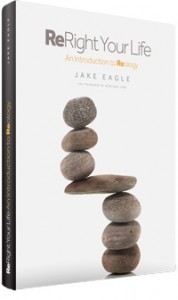
This award-winning book will give you an introduction to Reology and tools you can use to ReRight your life, right here and right now. It’s written is an easy to read style as a conversation between Jake Eagle and his brother. It explores the meaning of life, core-limiting patterns that hold us back, the process of individuating, ways to discover our values, and a new way to speak to yourself and other people.
To get free shipping on this book—enter the coupon code: freeship
This book was previously published as Speak Love Not War, and although much of the content is the same, this new edition introduces the reader to Reology, as well as some updated chapters.
Get the book »
The post Planeta Interview With Jake Eagle appeared first on Reology.
September 13, 2013
What Is Love?
 What is love?
What is love?Certainly “what is love?” is a nebulous question with probably as many answers as there are people. One definition that caught my attention recently was Victor Hugo’s quote, “To Love another person is to see the face of God.”
If we were to believe that this is what love is, wouldn’t we all treat those we love very tenderly—all of the time? And if we don’t do this, why don’t we?
Lots of reasons, but if we have chosen the right partner, the times when we don’t love each other tenderly happen most often because we feel insecure.
And when we feel insecure, we blind ourselves to our love. We get our feelings hurt and then want to hurt back.
And, I ask myself, if we aren’t being tender, are we being loving?
Recently, the marriage of one couple I know in Canada has been in serious trouble. Basically he hasn’t done the personal work that he has needed to do in his life. And though she has, she has been too insecure to draw the line on his behavior, to hold him accountable and insist that he step up to do his own work.
He is the bully and she the bullied. They may have had moments of tenderness in their long marriage, but much of his relating to her has been disrespectful and tense. And yet she believes she loves him.
Is That Love?
From my perspective, this partnership looked more like a pressure cooker that was on simmer, not at all like looking into the face of God.
And because they did not pay attention to the direction they were going, and did not create agreements about how they would treat each other and hold each other accountable, the pressure cooker has finally blown.
They are currently living as adversaries. I wish I could help them but I can’t. This is the life they have chosen. He has been in control, which gave him some fragile sense of security and, in my mind, her security has only been an illusion. Things are falling apart and tenderness has all but been forgotten.
Isn’t love that isn’t tender just masquerading as love? Shouldn’t we be calling this by it’s proper name: dependence, insecurity, fear of being alone, and perhaps a need to feel powerful?
Most of us have never stopped to ask ourselves “what is love?” We weren’t taught how to love well or be loved well. We weren’t told to hold high expectations of the partners we choose. We haven’t had many good role models and so we’ve ended up settling for less than we could have or treating our partners poorly.
We often don’t even know what is possible. If the couple, above, once had some idea of what real love was, if they had once loved like they were looking into the face of God, they have since numbed themselves in order to tolerate the intolerable. They don’t even know what intolerable is anymore.
Love is NOT never having to say you’re sorry.
What is love? Love is the act of loving. Love is a verb. Something we actively do or don’t do.
We can best love and be loved when we live our lives consciously and make healthy choices—and don’t let ourselves slip into numbness, ignoring the things we need to look at. In Reology, we learn that we do have to say we are sorry, and we find that we feel quite good about ourselves when we do. We don’t have to suffer the insecurity of needing to be right or having to justify our behaviors. We learn to apologize, redo ourselves quickly, and get back to loving each other.
We can choose to do this personal growth work, gather healthy relating tools, make healthy agreements and boundaries, and lovingly hold the people around us and ourselves accountable. This is what creates security and allows us to relax into really loving each other tenderly—and seeing the face of God.
The post What Is Love? appeared first on Reology.
September 7, 2013
Finding Yourself – A Love Story
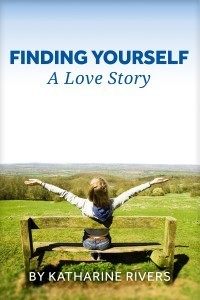
Finding yourself is a journey
Finally, one perfect day in early July, I arrive in northern New Mexico with comfortable clothes, a journal, sunscreen, a jacket for cool nights, and rain gear. I’m aware that I’m carrying my interior baggage as well—hoping that someone will be heavier than I, uglier, older, more insecure, more anxious, less spiritual and less enlightened.
As I watch the participants arrive, I worry that I won’t fit in, that I’m too high strung, too nervous. I first see a couple with all the right equipment: designer backpacks, cool sun hats that I can never find, the right sunglasses. Ruggedly handsome and confident, he’s carrying a mandolin. She is petite and perfect with curly hair. They smile at each other, their eyes sparkling. I look at my rolling city suitcase and my thirty extra pounds of soft middle-aged weight, and I think: 0-1.
The next couple is tenting just beyond the apple orchard, that is the front yard for the yurt where I will be staying. They are both fit, happy, and gorgeous. She moves like a ballet dancer and his lean build tells me he rides a bike and can probably rest his ankles on his shoulders and drink coffee at the same time. Their bodies seem to meld into each other as they glide across the grass. They are in love, their life is perfect; I’m certain they do naked yoga together every morning, and I imagine that their sex life is explosive and tender. As I watch them, I feel myself trying to suck in my belly; I am single and have no hopes for love; my shoulders droop. 0-2.
I am shaky and anxious
I am relieved when I see two middle-aged women and an older man arrive. But my relief doesn’t last long. I watch them unpack their shiny, new cars (two BMWs and an Audi). They all have expensive luggage sets and they look rich and successful. The women appear powerful, moving with determination and efficiency. The silver-haired man seems kind and gentle like a grandfather. Smooth and easy with themselves and each other, they’ve done this before. Now it’s 0-5, and I am shaky and anxious.
Finally, I see one of the hosts of the retreat, Hannah Eagle. She, and her husband, Jake, are the co-founders of Reology. They’ve been working together in the field of psychology, mental health, and homeopathy for over twenty years. She is almost ten years older than I—yet she has the body of a twenty-year-old and a bounce in her step. She is literally glowing. I’ve connected with her on Skype so I know who she is—I feel a lump rise in my throat, and I am desperate for her to make me feel better, to give me a sense of belonging. She greets me with warmth and enthusiasm and a smile that could melt a glacier. When I look at her sparkling cornflower blue eyes, I feel myself cracking. As I weep in her arms, I cannot breathe. I am embarrassed at my lack of control. 0-6.
Another concern pops up
As I head to my lodging, I try to calm myself. I worry about my wardrobe of comfortable clothes; I shop at Old Navy— not on Fifth Avenue. I don’t do yoga in $90.00 Lululemon stretch pants. I don’t do yoga at all, but if I did, it would be in sweats. Another concern pops up as I unpack, a friend dropped me off, and I realize I’ve left my water bottle in his car. The bottle was number 1 or 2 on the list of requirements. I feel like an idiot. 0-7.
To read the rest of this story—download the digital edition of “Finding Yourself—a love story.”
First and Last Name:
Your Email:
The post Finding Yourself – A Love Story appeared first on Reology.
August 30, 2013
How To Dream
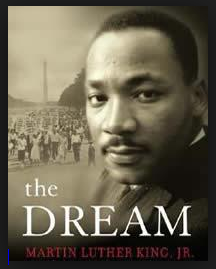
I have a dream . . .
I have a dream of a gentle world
Spacious and soft
A world where we each know what we value
And we value our humanity and divinity alike
I have a dream of a world where our differences
Don’t divide us but define us
As unique and irreplaceable
Each person standing in fullness
Oceanic in our wholeness
I have a dream of escaping
The limited perspective of good and bad
Right and wrong
A dream where we do not deny
The duality of self and other
But celebrate the distinction of you and me
For we are each alone
And in our aloneness together
Each a light
A temporary flame
We will extinguish
In only a moment
So while we are here we seek to connect
To touch and be touched
To see and be seen
To show and to say, ‘This is me, I see you.”
I have a dream today
That no one hides
White man or black man, rich or poor
Male or female, looking or lost
Graceful or wasteful, knowing or naught
Strong or scrawny, boastful or bashful
For on this day we can all be free at last, free at last
Great God almighty, free at last
The post How To Dream appeared first on Reology.
August 23, 2013
Is Rapid Self-Improvement Possible?
 Here’s the question I’ve been pondering. Do we need to grow one step at a time, going through each developmental stage, building from the ground up—or—can we leapfrog?
Here’s the question I’ve been pondering. Do we need to grow one step at a time, going through each developmental stage, building from the ground up—or—can we leapfrog?
Leapfrog . . . you know how they talk about developing countries not needing to lay thousands of miles of telephone lines to build their communications infrastructure, because when cell phone technology arrived they could leapfrog that stage of development. They could skip it entirely and go to a whole new level that didn’t even require telephone lines.
Is it possible for human beings to leapfrog aspects of our emotional and psychological development?
I don’t think we can skip an actual stage of development. The chart below shows 10 stages of development we all may grow through if we live a long and full life. Yes, I said, “we all may grow through,” because many people—most people—limit their own development and stop growing somewhere along their journey.
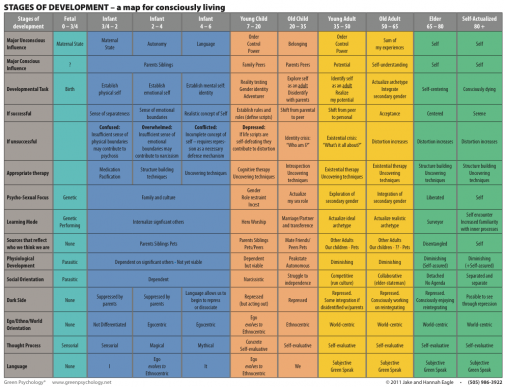
Click this link to request a full size version of this model.
But even if we can’t skip any of these stages of development, is there a way to rapidly accelerate our emotional and psychological growth?
I think so. And certainly many people try.
The spiritual path
Our desire to leapfrog ourselves, to jump ahead and suffer less, is what motivates many people to walk a spiritual path. And I think this is largely the right idea. The spiritual path is primarily about doing our inner work. If we do a sufficient amount of inner work we begin to relate in a different and healthier way to the external world.
However, a problem arises. It’s known as “spiritual bypassing.” This happens when we focus on our spiritual development as an excuse to avoid dealing with our psychological development or our relationships. We go internal to avoid the discomfort of facing certain things in our lives.
In an interview I did with Ken Wilber, the acclaimed modern day philosopher and spiritual teacher, he acknowledged that spiritual bypassing is a real problem.
He told me, “In some cases, meditation can actually make matters worse. In fact, the way we found this out wasn’t theoretical, but looking at the results after twenty or thirty years of meditation pouring into this country, like Zen Buddhism, Tibetan Buddhism and the other Eastern traditions. They really had a huge impact. At that time a lot of the psychologists just assumed meditation would make everything better. That enlightenment would make it all better. But, what we found after all that time of Americans doing meditation was that some of the meditation teachers still had big shadow elements and in some cases it had gotten worse. “
Wilber agreed with me that certain psychological and relationship issues couldn’t be resolved solely by pursuing a spiritual path.
So, if we can’t go around these issues—spiritually bypassing them—the next strategy is to confront them. And the key word here is “confront.” But the very idea of confrontation raises the specter of losing, or being proven wrong. Must we summon our courage to confront the shadow elements in our lives? Yes, at times this is appropriate and it’s emblematic of what people often do during the “old child” and “young adult” stages of development as shown on the chart above.
But, in actuality there is another way—this is the key—that makes leapfrogging possible.
We can resolve our psychological and relationship issues without confrontation. The key is no longer seeing people as having power over us. We don’t need to win or be right, we only need to be true to ourselves.
I am describing a fundamentally different way or relating—to ourselves and other people—and this is what Reology is all about.
When we live this way we eliminate our fear of:
Being hurt
Being judged
Being vulnerable
Revealing ourselves
Asking for what we want
A moment ago I said, “We can resolve our psychological and relationship issues without confrontation,” and here the key word is “resolve,” which from Latin, resolvere,means to untie. Who unties? We untie. We each untie ourselves. No one does this for us. And that’s the key to accelerating our growth.
In the old paradigm, when people have power over us, either we confront, or we bypass. What I find so interesting about this new paradigm—Reology—is that we end up where the spiritual path was intended to take us, but with our psychological issues resolved and our relationships expressed in a new kind of conversation.
If you’re searching for rapid self-improvement, open up to the tools and teachings of Reology and you’ll leapfrog over the places in which you are stuck.
The post Is Rapid Self-Improvement Possible? appeared first on Reology.
August 16, 2013
Stand Up For Yourself
 Moms (and Dads) have their ways. They can be pretty powerful in good ways and in not so good ways. Much guidance and direction are needed when we are young, but when you find you’re still being directed or manipulated and controlled by your parents as adults, how do you stand up for yourself?
Moms (and Dads) have their ways. They can be pretty powerful in good ways and in not so good ways. Much guidance and direction are needed when we are young, but when you find you’re still being directed or manipulated and controlled by your parents as adults, how do you stand up for yourself?
Patterns of parental control are often not even recognized when we are adults because we are so used to them. Once identified, the solution is breaking the pattern.
(And by the way—we also need to break certain patterns with our partners. First we individuate from our parents, and then we individuate from our partners.)
Someone recently wrote to us wanting help with individuating from her mother. She described her mother as the kind of person who always needs to be right.
She said that there were many times when she tried to assert herself, but her mother would either “crumple or get very righteous”, and the conversation would go nowhere. She consistently felt judged by her “very judgmental mother”.
This was a pattern set up long ago, the daughter trying to assert herself, the mother being emotionally controlling and manipulating, and the daughter never feeling heard.
Individuating From My Mom
Years ago, when getting therapy around this very issue, I was given the assignment to, once again, go confront my mother. However, this time, I was to notice how she would try to manipulate our conversation.
My therapist told me, “watch what she does.” He predicted: “She will get angry, and if anger doesn’t work, she will go to tears, and when tears don’t work she will return to anger and when that does not work she’ll return to tears.”
That’s just what happened! I was amazed. I couldn’t believe I’d never noticed this before. Here’ how it went.
I arrived at my mother’s house and asked if we could talk for a few minutes. We sat down at the kitchen table. After my first two sentences she bristled and before I could pause for my next thought she was angrily lashing out at me.
I calmly thought, “Okay, here’s the anger.” She paused to notice that I was not flaring up, and then she burst into tears. She was the victim, and I was the perpetrator. I said to myself, “stay calm and stand up for yourself—here are the tears.”
When she noticed the tears did not phase me, she really got angry! “There’s anger again.” And shortly thereafter she flipped to tears.
Oddly enough, I even pointed out what she was doing, but she could not stop herself from acting out the same pattern over and over. This is how she had handled (perceived) threat all of her life, she did not know how to behave otherwise.
Between her anger and tears, I’m not sure how much she heard of what I had to say that day. But that wasn’t what was important to me.
What was important was that I was able to observe my mother’s—mostly unconscious—behavior; yet this time I didn’t allow myself to be manipulated or controlled. I was able to remain an observer, stay calm and clear and make my point.
It did not matter so much if I was heard. What mattered more is that I could say what I needed to say and stay calm.
Breaking Through Patterns
There was a pattern that was broken that day—I did not buy into her manipulation this time. I did not react when she moved from one tactic to the other. I did not engage in the pattern at all. She could no longer control me. And after I broke the pattern, I was no longer affected by it.
From that day on, my sense of myself was quite different. I had taken my power back. I did distance myself from her for a period of time, as I got more solid on my individuated feet. But once I returned to relate with her again, I never slipped back into that old dynamic.
And because I changed, she changed. Actually, I believe she ended up respecting me more because I was finally becoming my own authority. That was a giant step in individuation.
Observing The Pattern Without Breaking The Pattern
So, why didn’t this work for the woman who wrote to us about individuating from her mom? The woman clearly saw the pattern between herself and her mom. This woman would “try to assert” herself and her mother would “crumple or get very righteous.”
The step she had not taken was to stop playing her part in the pattern. She did try to stand her ground but she did not express “an unshakeable sense” of herself when around her mom. It was “too easy to get lost.” Try as she might to resist, she still allowed herself to be sucked into the pattern.
Had she said to herself, “Oh there is my mom crumpling—and there she is being righteous,” and had she been able to stay the observer in a non-reactive way, more quickly than you might imagine the pattern would break.
If we change our part in the pattern, the pattern has to change.
Reology and ReSpeak Help
One more piece that I might add is that my process with my own mother happened more or less 25 years ago, before I knew ReSpeak. If I’d had some Reology tools in my toolbox, the conversation would have been easier for my mother.
If I had been using ReSpeak, it would have been easier for my mother to realize that I was not telling her about her, because I was only talking about myself, my experience, and our process could have been much more gentle.
The post Stand Up For Yourself appeared first on Reology.
August 9, 2013
Judging or Asking?

Hmmmm . . .
So many people are concerned about being judged or being judgmental. But, as a result, are we becoming overly sensitive about expressing ourselves? Are we becoming too politically correct?
Can I tell you what I think without you feeling judged?
Can you recognize—and value—that my opinion is just that? My opinion.
ReSpeak makes this possible.
But before we get to that, let’s take a moment to recognize that we all make judgments every day.
How we invest and spend our money involves judgments. Who to invite and who NOT to invite to social functions involves judgments. To run the yellow light or stop. To pass the car in front of us or not. To work late or go home and be with our families. We make judgments all day long.
Being “judgmental” in these ways isn’t what people get all amped up about. It’s judgments that have to do with placing a value on people. When we judge people as good or bad, right or wrong—value judgments—people become hyper sensitive.
But there is a difference between judging and asking
I recently spoke with my ex-wife. We hadn’t talked in a very long time—a year or two. We we’re catching up. And during this conversation she felt judged by me. But, from my point of view I wasn’t judging, I was genuinely asking.
She told me about some events in her life that caused her terrible emotional pain. I asked if she could have made other choices, ones that would have resulted in less pain. I was genuinely curious—curious about her, curious about the ways we suffer, curious about the value of suffering, curious if I could avoid such suffering in my life if I were faced with similar circumstances.
But, what she heard was some kind of judgment. To her credit, instead of backing away from me, which she later said she was tempted to do, she continued to engage and explain more about her choices and her situation. I came to deeply appreciate the choices she made in her life. And, although I still have questions about whether I would make the same choices she made or different ones, I’m not judging her.
We need to be able to express our differences without judging people. The best way I know to do this is to use ReSpeak. Because if you step into the world of Reology and ReSpeak you step into a world without worry about what other people think of you—or less worry.
With ReSpeak, we realize people are never telling us about us, they are always telling us about themselves. So when someone says to me, “Oh my god, you must feel so embarrassed,” what I hear them saying is that if they were in my shoes, they would feel embarrassed.
Or, if someone tells me, “You’re being really harsh,” I hear them saying that if they behaved the way I behave, they would feel like they were being harsh. Okay, I hear you, but I don’t hear you judging me. I hear you telling me about yourself.
In the world of Reology we don’t make judgments about whether other people are good or not. Instead, we express ourselves by talking about our needs, wants, and our boundaries.
“I need you to be totally honest with me,” is not the same as saying, “You’re dishonest.”
“I don’t feel comfortable when you flirt with people,” is not saying, “You’re untrustworthy.”
“I don’t like it when you speak to me that way,” is not saying, “You’re rude.”
In each of the above examples I am giving you information about me. I am not telling you about you.
People have a right to tell us what they want, need, and feel. The problem—if they don’t use ReSpeak—is that we will think they are telling us about ourselves. Then we get defensive and the conversation shifts from focusing on how they were feeling to accusing them of judging us. Then they say, “You’re not listening to me . . .” and the whole thing goes downhill from there.
So—you might ask—if I was using ReSpeak with my ex-wife, why did she feel judged by me? Well, if she reads this blog, maybe she’ll comment, but here’s my take. I imagine that she may not have felt supported by my questions, almost as if I were challenging her decisions. Even so, because I was using ReSpeak, it was easier for her to stay engaged with me, which allowed us to reach a deeper understanding. And, had she known ReSpeak, she wouldn’t have felt judged in the first place. This is why it’s so valuable to learn and practice ReSpeak as a couple.
Tension naturally increases when people we respect don’t agree with us. But instead of pushing back and saying, “Don’t judge me,” we can help ourselves by entertaining other people’s ideas and opinions. We can learn and grow and expand our own view. Using ReSpeak doesn’t guarantee that people won’t feel judged, but it significantly reduces the likelihood.
Here’s a test: Are you judgmental?

Do you make a value judgment about this man?
Do you feel compassion for him?
Do you want to understand him?
If you met him, what would you want to ask him?
When we live in the Reology orientation we become more certain about ourselves and less certain about other people—judgmentalness is replaced with curiosity.
The post Judging or Asking? appeared first on Reology.
August 2, 2013
How To Die Well
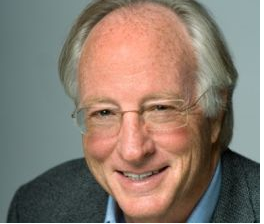
Ken Brill
I’ll tell you a short story about a friend of mine who showed me how to die—and how to die well.
Ken was a flawed person—like all of us. And he used his flaws to fuel his personal growth. This wasn’t natural to him. With a degree in engineering and an MBA from Harvard, he lived in his head—always analyzing, always looking for solutions. Ken didn’t exude warmth or empathy, but “warm” traits are only one form that love takes. Some people show love in other ways. Ken did.
When he was in his thirties, Ken started his search for meaning, looking to become a better man. The messages he received early in life resulted in him not being sure he was a good man, or maybe worse, being pretty sure he wasn’t. But something in him compelled him to look deeper, to keep searching. He had a saying that he lived by, “A well defined problem will seek its own solution.”
Ken spent years defining the problem. When he offended people—if he was aware of it—he would ask, “How did that happen? What could I have done differently? What’s a better way?” Sometimes the learning would stick, sometimes it wouldn’t. And sometimes he just never noticed what he left in his wake.
As part of his search for answers, Ken attended eleven Weir Labs. These were personal growth intensives conducted by our mentors, John and Joyce Weir. The retreats we offer today are modeled after the Weir Labs (“labs” is meant to indicate a place where people go to experiment, to explore, and to learn). For Ken, what was so remarkable about participating in these labs was that he experienced himself in a dramatically different way.
It was common for people to appreciate Ken for what he knew, but in the labs, he was appreciated for who he was.
Ken altered the course of his life by attending these retreats. And, as a result of meeting Ken in 1997, my wife, Hannah, and I altered our lives. He told us we needed to meet John and Joyce Weir. He was just sure that we were the right people to become stewards of their work. At the time the Weirs were eighty-five and they were looking to train people who could carry on the work they had created.
As was true several times in Ken’s life, he was prescient. Hannah and I met the Weirs, went to the last training they ever put on, spent six years studying with them, and found our life purpose. The Weirs’ work has evolved into Reology, and the retreats or labs that we now conduct two or three times a year are the offspring of what John and Joyce originally developed.
Although Ken was quite famous within his own profession, a world-renowned expert in the data center industry, he told me that he thought his greatest legacy might be the result of having introduced us to the Weirs. He so deeply believed in the unique model the Weirs created, that he thought his greatest contribution might be making sure the model lived on beyond the Weirs, and he insisted that we find people to train so that this lives on beyond us.
If you’re not familiar with the Weirs’ model, it’s a way of speaking to ourselves and others that elicits the better angels of our nature.
One year ago Ken was diagnosed with an brain tumor. He was told that he would have one year to live. After “defining the problem so that a solution would become apparent,” he declared that he wanted to figure out how to die as well as he could. He said, “If I’m going to do this I want to do it really well.” He then signed up for the next retreat we had scheduled, which was the program we held in February, 2013, in Mexico.
Somehow, Ken managed to get himself to Mexico entirely on his own, and then participate in the lab with complete presence. In the very beginning of the lab he introduced himself by saying, “My name is Ken. I’m dying and I came here to make sure I do this the best way I can.” He worked hard during the retreat, discovering new parts of himself, determining what his priorities were, and owning all the emotions that attend the dying process.
By the end of the lab he had identified the people in the retreat who he perceived to be people of means, financial means. He approached them individually asking them if they would financially support this work going forward. The reason he did this is because over the preceding ten years he had provided financial assistance so that people who normally couldn’t afford to attend one of these workshops would be able to do so. He was concerned that with his passing there wouldn’t be sufficient funding to help people who were financially less fortunate.
As I said earlier, we each have our own ways of showing love.
At the end of the retreat in February, Ken asked me to sit with him and watch the ocean. As we sat together he told me, “I’m really glad I came to this program even though a lot of people told me not to. I feel so good about the work I did, so good about myself, and I go home happy and I’m ready to die. It’s okay.”
Ken then spent the next six months wrapping up loose ends, cleaning up his emotional footprints where possible, reconnecting with his children in ways he had wanted to do but hadn’t made time for, trying to make sure the people he loved would be taken care of after he was gone, and calling me to talk about some new insight he’d had or some emotional problem that he wanted to solve.
Ken didn’t believe in perfection, but rather, continuous improvement.
Five days before he died he had a conversation with a former employee because he hoped to clear up a mess from their past. The next day he went to sleep and over the course of five days he slipped away. I think he figured out how to die in a way that was “right” for him. Which is fitting, because when confronted with a conflict or a challenge he always said, “Let’s do the right thing.”
The post How To Die Well appeared first on Reology.
July 25, 2013
The Rap on Death
 Death
DeathWhen you exhale your last breath
Tick tock
Nothing
Like a ship sailing off the edge of the world
Do you remember falling asleep last night?
I don’t and I woke up with a fright
Wow I’m still here
What if tonight
Is the last time I see the light
It used to be fear of the nature of the death
The burning or the drowning or the tearing of the flesh
But now although I don’t fear those any less
It’s all about the end of consciousness
Some absence of place
Where it all goes black
A fundamental lack
What does silence sound like when you’re not there to hear?
What does black look like when you’re not there to see?
Before there was a universe there wasn’t even space
That is the size of the fear I face
The mind’s eye can’t see
What it’s like not to be
Never mind
That I’ll have no mind
How am I supposed to relax
When I’m in full possession of the facts
That there’s no sign
Of any grand design
So I don’t feel fine
Because sooner or later I’ll cross the finish line
What’s the point of my life
What’s the point of the strife
If I believed in heaven would I feel more prepared
If I believed in hell could I be more scared
Will I ever feel steady
Enough to be ready
Finally
When my eyes turn cold
Will I have been sold
All the shit that I’ve been told
The great big lie
That the more and more I buy
Will satisfy
Or will I spend the time remaining
On family, friends and pets
And not get too caught up in projects
To make the right choices
And listen to the beloved voices
Thinking of all the things I’ll leave behind
All the precious fragments of my mind
I become just this blob of slime
Clinging to my life time
All of you who I’ll leave behind
Really leave me
You continue to be
While me
Eyes full of dirt don’t see
I’m trying to think of something smart and sassy to say to death
But I think he might say to me instead
I think I’ve heard it said
That being rich and clever doesn’t matter when you’re dead
Brother
You’ve got no time left
So I hope you did your best
-
The post The Rap on Death appeared first on Reology.



